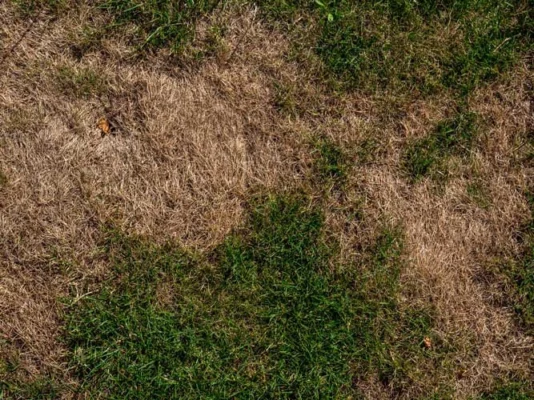If your lawn is in poor condition, determining the cause is the first step to restoring its health. Is overwatering to blame, are pests causing issues, or is the soil compacted? Environmental factors like weather or improper mowing could also contribute to the problem. Knowing the cause makes it easier to plan the right treatment. Common lawn issues include:
To make your search for the best fungicide easier, here’s an overview of the most widely used products.

Thatch or Soil Compaction
Soil compaction forms as the ground becomes more compacted over time, while thatch is the accumulation of decaying organic matter like dead leaves on the soil surface. Though they differ in form, both make it harder for grass to receive the nutrients it requires. If you detect either issue, aerating the soil and clearing away the thatch is a great solution.
Lack of Nutrients
Grass won’t thrive if your soil lacks the essential nutrients it needs. Fertilizing your lawn twice annually ensures your turf stays healthy. We recommend applying fertilizer in the spring to jumpstart growth and again in early fall to help your grass prepare for the colder months. Consistent fertilization supports strong, vibrant grass year-round.
Improper Irrigation
Watering your lawn too much or too little can cause significant harm. Overwatering fosters pests and fungus, while underwatering results in brittle, weak grass. Consistent watering helps promote strong, deep roots. Water 2 to 3 times per week, for 20-30 minutes each time, ideally early in the morning. This ensures the moisture is absorbed effectively before the heat of the day.
Need Lawn Care? We Can Help.
Click the button below to leave your information & we'll be in touch in an hour or less.
Need Pest Control Service?
Leave your information below and we’ll be in touch with a FREE quote!
"*" indicates required fields
*During normal business hours. After hours calls will be returned the next business day.
Poor Mowing Practices
Mowing mistakes, like cutting grass too short or using the wrong mower setting, can harm your lawn. To keep your grass healthy, follow these helpful mowing tips:
- Grass Length: Keep at least 2 ½ or 3 inches of grass length.
- Mower Settings: Avoid using the highest setting on your mower.
- Blade Maintenance: Replace your mower blades at least once annually.
- Mow Dry: Do not mow a wet lawn.
Infestation or Illness
Florida lawns are often susceptible to pest infestations or fungal outbreaks. Look for signs like bite marks on grass blades or irregular brown patches. If you notice these issues, it’s crucial to reach out to a professional promptly for effective treatment. Early intervention can prevent the problem from worsening and save your lawn from long-term damage.
Revitalize Your Lawn With Expert Help
When all your efforts fail and your lawn remains in poor condition, it might be time to seek professional help. Lawn care specialists can identify and treat the issue effectively. Acting quickly can help your lawn recover faster.
At Bug Out, we specialize in a variety of lawn care services that ensure your grass is healthy and vibrant. With over 60 years of Florida experience, our tailored solutions are perfect for rejuvenating your lawn.
Back to How to Avoid Fungus and Weeds in Your Lawn
